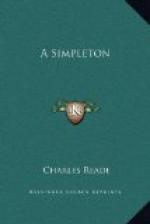In short, never was there a more voluble and interesting liar by word of mouth, and never was there a more agreeable creature interposed between a bereaved widow and her daily grief and regrets. He diverted her mind from herself, and did her good.
At last, such was the charm of infinite lying, she missed him on the days he did not come, and was brighter when he did come and lie.
Things went smoothly, and so pleasantly, that he would gladly have prolonged this form of courtship for a month or two longer, sooner than risk a premature declaration. But more than one cause drove him to a bolder course; his passion, which increased in violence by contact with its beautiful object, and also a great uneasiness he felt at not hearing from Phoebe. This silence was ominous. He and she knew each other, and what the other was capable of. He knew she was the woman to cross the seas after him, if Staines left the diggings, and any explanation took place that might point to his whereabouts.
These double causes precipitated matters, and at last he began to throw more devotion into his manner; and having so prepared her for a few days, he took his opportunity and said, one day, “We are both unhappy. Give me the right to console you.”
She colored high, and said, “You have consoled me more than all the world. But there is a limit; always will be.”
One less adroit would have brought her to the point; but this artist only sighed, and let the arrow rankle. By this means he out-fenced her; for now she had listened to a declaration and not stopped it short.
He played melancholy for a day or two, and then he tried her another way. He said, “I promised your dying husband to be your protector, and a father to his child. I see but one way to keep my word, and that gives me courage to speak—without that I never could. Rosa, I loved you years ago, I am unmarried for your sake. Let me be your husband, and a father to your child.”
Rosa shook her head. “I could not marry again. I esteem you, I am very grateful to you: and I know I behaved ill to you before. If I could marry again, it would be you. But I cannot. Oh, never! never!”
“Then we both are to be unhappy all our days.”
“I shall, as I ought to be. You will not, I hope. I shall miss you sadly; but, for all that, I advise you to leave me. You will carry my everlasting gratitude, go where you will; that and my esteem are all I have to give.”




